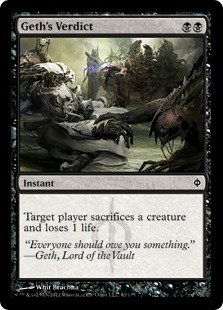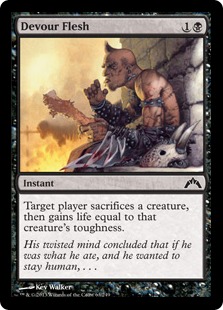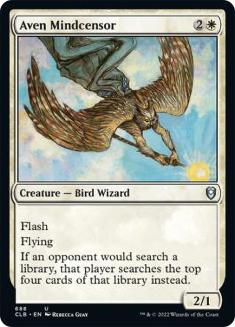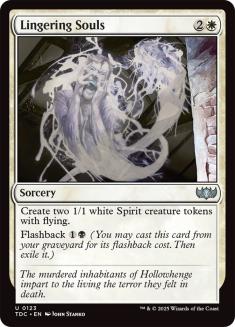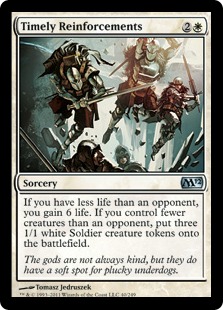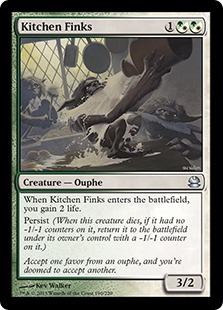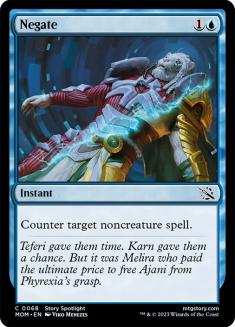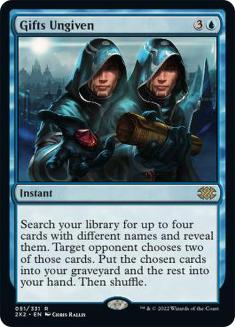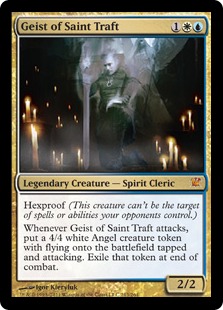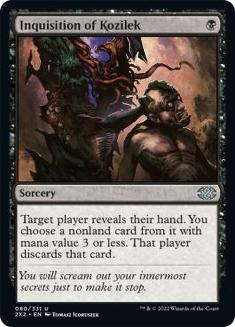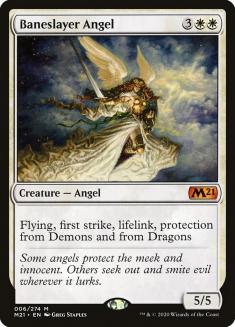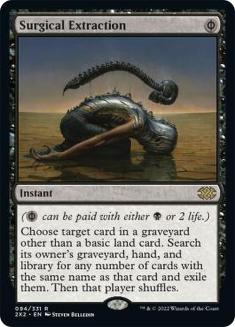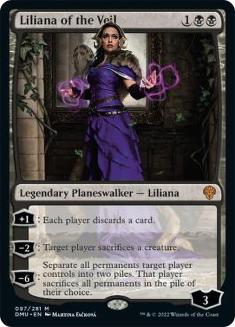Last week I wrote an article that, while not all-inclusive, should’ve given you the foundation to deal with the intangibles in Magic. Hopefully, you can use that to be successful and happy in Magic, no matter what sort of Magic player you want to be. Consider this article an add-on to last week’s article.
Dealing With Variance
Most of the things from last week tied into the idea that playing competitive Magic is one long session, and this is one of them. When you mulligan to four playing for Top 8, it’s not a pleasant experience. You might say things like “I got robbed” or “my opponent didn’t deserve to win,” but honestly, who are you to judge that? You and your opponent played a match and he or she won. The specifics don’t matter much.
Maybe you would win every single match in which you didn’t get unlucky, but then you wouldn’t be playing the same game nor would so many other people. Magic is a successful game for a reason, and a lot of that has to do with the fact that variance exists. Without it, not only would a new player have zero chance of beating a good player, but the game would also be less exciting as a whole.
I feel like good players typically have a difficult time dealing with variance because they always get it in good. Allow me to explain.
In poker, the idea is that you consistently get your money in the middle when you are ahead. Over time, if you’re a 51% favorite a million times, you’ll end up making a lot of money. Of course, Magic isn’t poker, at least as far as a cash game equivalent. You don’t get paid big time on each game you win while losing as little as possible the times you do lose. Magic is kind of unfair in that regard, but it is what it is.
The really unfair part is that if you are always getting it in ahead (so to speak), you will never be in a position where you have to suck out on your opponent. In that regard, you rarely end up seeing situations where you got lucky to win, while you always bear witness to the times when you get unlucky to lose. That can be difficult to deal with, but if you are counting every time you played well and made good decisions as a win, then that’s all it should be. Whether or not you got the three match points isn’t relevant in the scheme of things. Eventually a time will come when you made good decisions and variance won’t stand in your way.
I know it’s a tough pill to swallow, but once you wrap your head around it, you’ll be much happier as a result.
You’re Not The Only Person That Matters
Again, this can be a tough pill to swallow.
As a person who was just working for Wizards of the Coast, I can assure you that your opinion matters and that it is heard. However, that does not mean that you are always correct and that WotC or whoever else should bend to your will. Things are the way they are (typically) for a good reason, and if you are personally affected negatively by some sort of change, you should try to see it from their point of view.
Decisions are not made lightly, and if they do affect you negatively, chances are it’s for the greater good. I’m all for doing things that benefit the majority of the populace, but not everything is going to be mono-positivity. It can be rough when it feels like the world is out to get you, but I assure you that we are better off discussing things rationally rather than just saying “I don’t like this because I’m getting the short end of the stick.”
Regardless, you need to be aware that with any change, there are likely going to be some growing pains. Not everything gets done perfectly on the first try, but your feedback helps things move in the direction that’s best for everyone. If you want your feedback to be taken seriously, conducting yourself in a professional manner is the best way to go about it.
Complaining
It’s easy to be negative. Blaming anything other than yourself will probably be your kneejerk reaction. Focusing on how bad things are is easier than trying to change them or deal with them.
I might vent occasionally, but I try not to and think I’ve been pretty good about it, especially in the last few years. I don’t think I’ve ever complained about a change to the system or a change to Magic; I’ve just dealt with it. Things will change and sometimes you’ll be affected for the worse, but there is typically nothing you can do except complain on social media and hope that someone will agree with you. If that’s your goal, then a better strategy would be to do what I talked about in the previous section.
I don’t dislike any format (as long as it’s competitive). What makes a format “bad” is objective. If you don’t enjoy the game play that the pillars of the format provide, that is acceptable, but there is almost always a work around. The thing that always confuses me is when people say a one deck format is bad, a three deck format is bad, and a ten deck format is bad. What exactly do you want? Can’t we just enjoy the fact that we get to play Magic a bunch?
Personally, I enjoy having formats where the pillars are very obvious because it tells me exactly what I have to fight. I realize that’s not for everybody, but even if something like Mono-Black Devotion is the best deck, I feel like we have it pretty good right now with R/W Burn, Monsters, Blue Devotion, Green Devotion, Red Devotion, U/W/x Control, G/W Aggro, Mono-Red Aggro, Hexproof, White Weenie, W/U Ephara, etc. That’s a lot of diversity, even if there is a best deck.
Magic is ever changing and you need to change with it. “Spells have haste” is no longer a huge advantage for control decks. Striving for inevitability is no longer strategically superior. I miss those older days, but that’s not what Magic is anymore, and guess what? I still like Magic.
What Does Magic Mean To You?
I think this is pretty important for your well-being. For a long time, I resented Magic and treated it like my enemy. I had nothing better to do with my life and blamed Magic instead of myself. The issue was that I thought there was something better out there I should be spending my time on, and it made me hate myself because I wasn’t living up to what I thought my potential was.
Maybe that’s true and I could have accomplished so much more. After being around for a long time and doing some soul searching, I realized that Magic is all I want to be doing in some capacity. There is no shame in doing what you want instead of doing what you think you’re supposed to be doing. Figure out what you want out of life and take it. Don’t worry about what other people think because the only thing that matters is that you’re happy.
Make sure you’re enjoying whatever it is that you’re doing. In Magic, there’s probably something for everyone, so find what it is you enjoy the best and stick with it. Don’t let others color your opinion of decks or formats. Everyone wants to play Magic a different way and that’s okay.
If your friends insist on you playing Magic their way, whether it be by playing certain decks, certain formats, or as much/little as they do, they aren’t truly your friends. A true friend will always be looking out for what’s best for you and do their best to make that happen.
Sideboarding Guides And Analyzing Data
Sideboarding guides are useless if you are focused on being the best Magic player you can possibly be. I could tell you roughly how I’d sideboard in any given matchup, but exactly how I sideboard is going to change game to game, opponent to opponent, depending on the composition of their deck, how they play, and how they sideboard against me. In short, by giving you a sideboarding guide I am potentially giving you information that will be a net negative on your tournament performance assuming you follow it to the letter.
Also, what works for me won’t necessarily work for you. If I’m writing about something, you can assume that I believe it to be true, otherwise I wouldn’t write it. That doesn’t mean that you’ll be able to emulate any success I’ve had if you take my advice blindly. At some point, you’re going to need to learn how to think for yourself, tweak your decks to your metagame, build your own sideboards, and make your own decisions. Your results will be much better.
I do think that most people want to do things on their own, and I write my articles targeted at those people. The biggest sections of my articles are generally the how’s and why’s I came to the 75 I played, not just “here’s a decklist and here’s how you sideboard.” You might have to read between the lines to figure out how I knew that card X was good against deck Y, but I try to make it as helpful as possible.
My method of learning involves looking at a bunch of data but not necessarily analyzing it. As I’ve said before, you have to be able to understand the how’s and why’s, otherwise it’s impossible to analyze data if you have no idea what it means.
Analyzing data adds to my previous knowledge base which makes it easier to say “yes” or “no” to certain things. I don’t use data to overanalyze metagames or what’s been winning, as that data doesn’t take into account what matchups truly are. For example, in the Caw-Blade or Delver eras, a good pilot with those decks would win far more than their alleged 65% win percentage.
There are certain matchups, like Jund Monsters vs Mono-Black Devotion, where if both players are competent, Mono-Black likely has the advantage. However, if both players are incompetent, Jund probably wins more often. The reason for that isn’t that Jund requires less skill to pilot but that what Jund is trying to do in the Mono-Black matchup is fairly straightforward, whereas Mono-Black will often have to shift gears several times per game. Without a clear understanding of that, it’s much more difficult for Mono-Black to win.
So how does this work? As I said last week, I’ll learn a format and will take note of new or interesting ideas. I’m of the opinion that changing one or two cards in a decklist does matter and could be the difference between winning or losing. Therefore, I strive to find that edge that no one else has, as it’s carried me to victory in the past.
If I’ve done my homework, I’ll be able to see someon 4-0 a Daily Event with G/W Aggro maindecking four Skylashers and four Unflinching Courages and intuitively know how that will affect his/her matchups, both positively and negatively. Maybe their technology is something I didn’t ever consider because G/W wasn’t well-positioned or I didn’t personally like the deck. However, if control isn’t big, there’s not a lot of removal in the format, and Mono-Blue Devotion is king, that type of ballsy deckbuilding can payoff royally.
Being able to tell the difference between a good and bad idea is pretty important, because you’re either going to dismiss it assuming its bad or spend valuable time playtesting to figure it out assuming you think it’s good. Even if it’s a bad idea and I know it’s a bad idea, at least now it’s on my radar.
In order to process what’s “good” and what’s “bad,” you’re going to need to know what matters in a format. You’re going to need to know how the decks operate so you can exploit their weaknesses. That is just work you have to do on your own. Much like the sideboarding guide, I can tell you that Mono-Black Devotion is better as an aggro-control deck rather than a resource-based attrition deck, even if some of the games come down to attrition. However, even if I told you that, you wouldn’t necessarily know how to use that information to your advantage.
Deckbuilding
If I have an idea, I’ll start a new notebook page (since we’re going to need a lot of room) and list out all the cards I would consider playing. The second step is to fill in the number of certain cards that I know I’ll want. For example, four Brainstorm is generally a given. If I want access to basics, I’ll list out one Plains, one Mountain, two Island.
From there, I’ll use rough guesses for where I think I’ll end up and add it up. If I’m over 60, I’ll cut stuff until I’m there. Sometimes I’ll stop at 61 or 62 and ask a friend for advice or simply playtest it at 61 cards. Sometimes the deck will have more one-ofs than I would play in a “real” deck, simply to get an idea for how good the cards feel.
Keep in mind that the manabase is an extension of the maindeck, as is the sideboard. When building a deck, you should very much be building it as a whole and not in pieces. When constructing the rough outline for a sideboard, I’ll use the same model outlined above, but try to think about how many cards I need to sideboard in each matchup and what I want my deck to look like post-board.
The first draft isn’t going to be great, but generally my numbers end up being close to correct. Even if the idea doesn’t end up having merit, I will generally have it close to the best it can be on first pitch, assuming the deck idea stays intact.
Deck Tuning
I can also break down decklists pretty well at first glance, assuming I’m familiar with the archetype and format. In order to give an example of that process, I needed to find a somewhat interesting deck, and Modern is a great format for that.
Creatures (3)
Lands (27)
Spells (30)

This deck uses the Vivid land plus Reflecting Pool manabase from Lorwyn block to basically function like a Grixis / U/W/R mashup featuring Mystical Teachings and Cruel Ultimatum. After seeing this deck, the first question that comes to my mind is “Is Cruel Ultimatum actually better than Sphinx’s Revelation?”
Considering you can cast Revelation for cheaper if necessary and even at seven mana, Sphinx’s Revelation is almost as likely to win you the game, makes it not close in my mind. Considering what Cruel Ultimatum does to your manabase in addition to Sphinx’s Revelation being an instant, Revelation wins hands down.
It’s important to consider the ramifications of that, since things like Dispel exist and the Vivid manabase allows you to Teachings for all sorts of crazy cards, but I still don’t think it’s close. Putrefy is a reasonable removal spell that also answers Birthing Pod and Electrolyze is a powerful card with a lot of value, although one that loses a lot of its value once you add the 3U that you’d have to pay in order to Teachings for it.
Teachings should either find a card that catches you back up (like Consume the Meek), a cheap answer to a problematic threat (like Path to Exile), or function as additional copies of a cheap card that you don’t want to play multiples of (like Surgical Extraction). In this case, Teachings for Electrolyze is masturbatory and the exact thing we’d like to avoid.
So the general idea is that the extra colors aren’t necessary and we can get by with just being Esper without losing much, if anything.
Let’s take a look at our new list:
Creatures (3)
Lands (26)
Spells (31)

Other options:
Potential problems:
-I’m not a huge fan of Cryptic Command plus Supreme Verdict, but it has to be done. Add Mystical Teachings to that, and you have one clunky deck and that makes Snapcaster Mage much worse. Any sort of Divination is likely better than the difficult to cast Esper Charm and potentially Mystical Teachings, so black doesn’t seem worth it. For this exercise, we’re going to ignore that and just build the best Teachings deck we can.
-Our “bullets” rarely OHKO our opponents. If we are spending the time to cast Teachings, we need to be getting something powerful, but that doesn’t seem like it’s the case in Modern. Perhaps Gifts Ungiven is better. I think we’d rather have a quick draw two instead of a late game engine, plus Gifts has the added bonus of going the Solar Flare route with Unburial Rites. Perhaps this deck is simply a better option, but again, we’ll ignore that for now.
-I’m not 100% sold on the mana base. The numbers for each colored source are close, but I’m not sure how to make them any better without dipping into Darkslick Shores or Seachrome Coast, neither of which I wanted to play. Each manland certainly has its perks, so I’m inclined to try a split for now.
–Birthing Pod, fast aggro, and combo all worry me to a degree. Teachings and Gifts are both similar to Rock decks in that they have a bunch of answers and need to draw the right one at the right time. I’d like to be more proactive if possible. Thoughtseize maindeck is a concession to those scary, difficult to answer cards, but that pushes us further down a Rock-ish path.
-This deck does not have any ways to gain virtual card advantage. For example, a single Restoration Angel (if it sticks) will hold off an army of Wild Nacatls. In this list, we have to kill every single threat our opponents play, which may end up being too large of a burden. We have a higher average curve than most decks, so we won’t be emptying our hand as fast as them, plus we have more lands on average, so we’ll probably flood out more often than them. We don’t seem to be favored to escape the early game unscathed, nor are we are a huge favorite in topdeck wars. Add in something like Thoughtseize, and you’ve got a deck that doesn’t topdeck very well at all.
-I have no idea if the sideboard numbers work out.
***
So, there you have it — That’s a page out of my notebook, where a simple decklist is worth a couple thousand words and then some. Perhaps that’s still not enough “showing,” but I’m sure our new author Ross Merriam will let me know. As always, point any questions in the comments section and I’ll do my best to get back to them.

